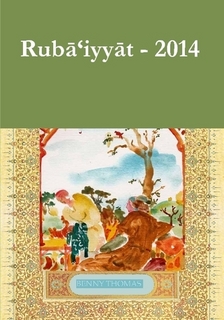 A new version of Khayyám’s quatrains was recently published by Benny Thomas, architect by profession and poet by temperament, in his own words. The work comprises 255 verses, some in rhymes, others only partially rhyming while the rest are blank verses.
A new version of Khayyám’s quatrains was recently published by Benny Thomas, architect by profession and poet by temperament, in his own words. The work comprises 255 verses, some in rhymes, others only partially rhyming while the rest are blank verses.
Thomas’ argument for yet another version or interpretation is that the voice of Omar Khayyam still speaks to us, “because we see in the quatrains our own unexpressed thoughts elegantly phrased”. In his foreword, Aminrazavi describes the quatrains by Benny Thomas as the “silence that makes music of the soul coherent to each”.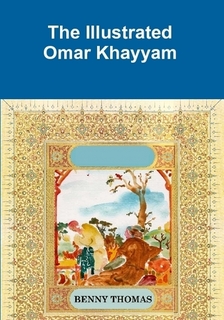
Khayyám’s quatrains must not be viewed “as a case for his adherence to Sufi tradition”, nor does the translator’s (that is FitzGerald), skepticism in the quatrains follow from not being true to the original, as Thomas explains. As a mystic he reads something else in them, or to paraphrase his own words: both Khayyám and FitzGerald are representative geniuses of our cultural heritage, who gave expression to the voice of their souls, the voice of their Inner Worlds.
The book was issued (as prints on demand) in three states: an illustrated paperback edition, a cheaper version without illustrations and an illustrated e-book. The illustrations were done by the translator. Available at Lulu.com.
Unfortunately, the work is not without errors. In the foreword (p. 7/9) we read: “Eight-hundred years after his death, the spirit and message of Omar Khayyám has once again celebrated in the exquisite quatrains …”. Many sentences are incomplete and for me, not being a mystic, some of the verses are almost impenetrable, for instance quatrain #158:
The color that we swore upon with life
Is false hue drawn from lie engenders strife:
In death and all enfolding gloom our souls
Must reorient with what is true or life.
More about Benny Tomas’ translation can be found on his weblog: “The Rubaiyat“, which also shows a number of the artist’s illustrations.
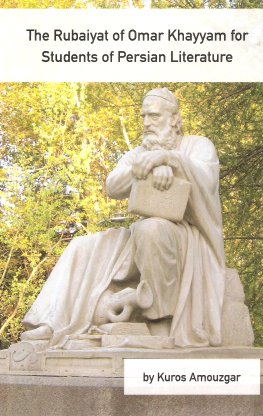 Kuros Amouzgar, educated as an engineer and living in the USA, translated the Persian text of Furughi and Ghani’s edition of the Rubáiyát, to help his children’s generation enjoy their Persian literary heritage. These children of Iranians living outside their homeland, often lack knowledge and understanding of the Persian language and literature. Khayyám is one of the most famous and well known Persian poets and his verses are easier to comprehend and to translate than other Persian poets.
Kuros Amouzgar, educated as an engineer and living in the USA, translated the Persian text of Furughi and Ghani’s edition of the Rubáiyát, to help his children’s generation enjoy their Persian literary heritage. These children of Iranians living outside their homeland, often lack knowledge and understanding of the Persian language and literature. Khayyám is one of the most famous and well known Persian poets and his verses are easier to comprehend and to translate than other Persian poets.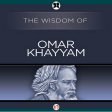 The Rubaiyat of Omar Khayyam. By E.F. Thompson. Narrated by Mark Turetsky.
The Rubaiyat of Omar Khayyam. By E.F. Thompson. Narrated by Mark Turetsky.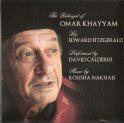 The Rubaiyat of Omar Khayyam. Translated by Edward FitzGerald. Narrated by David Calderisi.
The Rubaiyat of Omar Khayyam. Translated by Edward FitzGerald. Narrated by David Calderisi.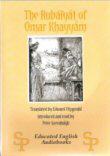 The Rubaiyat of Omar Khayyam. Translated by Edward FitzGerald. Introduced and read by Peter Greenhalgh.
The Rubaiyat of Omar Khayyam. Translated by Edward FitzGerald. Introduced and read by Peter Greenhalgh.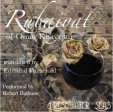 Rubaiyat of Omar Khayyam. By Edward FitzGerald. Narrated by Robert Bethune.
Rubaiyat of Omar Khayyam. By Edward FitzGerald. Narrated by Robert Bethune. Alfred Drake reads The Rubaiyat of Omar Khayyam. By Edward FitzGerald.
Alfred Drake reads The Rubaiyat of Omar Khayyam. By Edward FitzGerald. The Rubaiyat of Omar Khayyam explained. By Paramhansa Yogananda. Narrated by Donald J. Waters.
The Rubaiyat of Omar Khayyam explained. By Paramhansa Yogananda. Narrated by Donald J. Waters.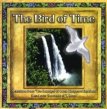 The Bird of Time. Selections from The Rubaiyat of Omar Khayyam explained. Voice and instrumentation by Swami Kriyannda.
The Bird of Time. Selections from The Rubaiyat of Omar Khayyam explained. Voice and instrumentation by Swami Kriyannda.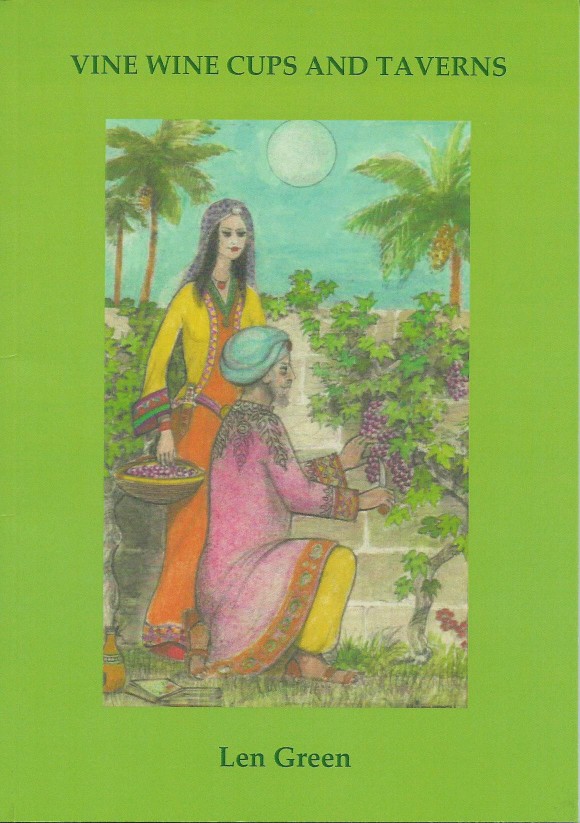 Len Green, from Australia, has just issued another book with selections from various translations of Khayyám’s verses, dedicated almost entirely to Omar’s wine quatrains and everything one needs to enjoy a good bottle: the vine, the grape, the juice, the draught, Saki, cup and cupbearers, bowls and bottles, jugs and jars, flasks and flagons, the rose and the tulip and of course your loved one.
Len Green, from Australia, has just issued another book with selections from various translations of Khayyám’s verses, dedicated almost entirely to Omar’s wine quatrains and everything one needs to enjoy a good bottle: the vine, the grape, the juice, the draught, Saki, cup and cupbearers, bowls and bottles, jugs and jars, flasks and flagons, the rose and the tulip and of course your loved one.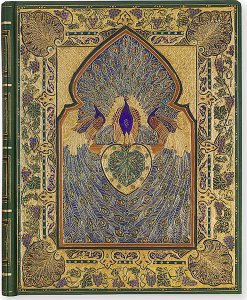 The Peter Pauper Press, well known for a number of editions of the Rubáiyát, have now issued a so called Great Omar Journal, a notebook providing 192 blank, lightly-lined pages “for personal reflection and creative expression”. The covers are taken from the famous Sangorski & Sutcliffe binding.
The Peter Pauper Press, well known for a number of editions of the Rubáiyát, have now issued a so called Great Omar Journal, a notebook providing 192 blank, lightly-lined pages “for personal reflection and creative expression”. The covers are taken from the famous Sangorski & Sutcliffe binding.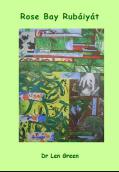 background of Khayyám’s poetry. He also published some paraphrases, written by himself. The book Rose Bay Rubaiyat has been published not for profit, and with appropriate authorization it is currently available for sale in support of Médecins Sans Frontières – Doctors Without Borders.
background of Khayyám’s poetry. He also published some paraphrases, written by himself. The book Rose Bay Rubaiyat has been published not for profit, and with appropriate authorization it is currently available for sale in support of Médecins Sans Frontières – Doctors Without Borders.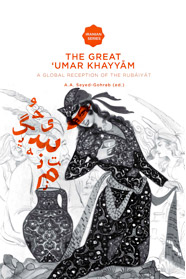 The book The Great ’Umar Khayyam, which consists of 18 essays about Khayyam’s influence, shows that traces of Khayyam can be found throughout Western literature and culture. Dutch poets such as Leopold and Boutens were inspired by him, for instance, but the quatrains also made their mark in 20th century painting and music.
The book The Great ’Umar Khayyam, which consists of 18 essays about Khayyam’s influence, shows that traces of Khayyam can be found throughout Western literature and culture. Dutch poets such as Leopold and Boutens were inspired by him, for instance, but the quatrains also made their mark in 20th century painting and music.